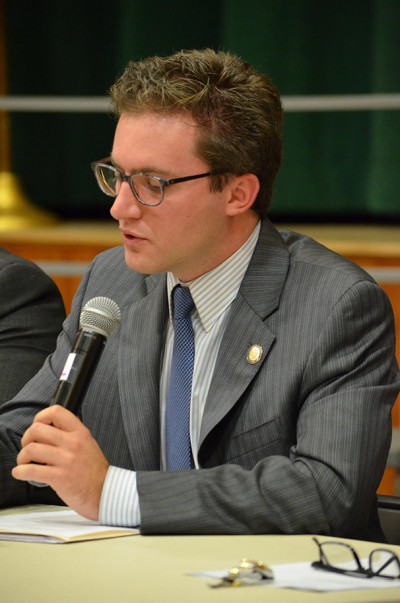Proposed bill plans paid state tuition
March 4, 2014

New York state schools may be tuition-free for in-state students in the future.
Assemblyman James Skoufis from New York Assembly District 99 is promoting his proposal to make CUNY and SUNY schools free for in-state students.
If the bill, introduced in late January, passes, it would be the only state program of its kind in the United States.
“The core principle of the bill is to make our public colleges in New York more affordable and accessible,” Skoufis said.
To apply for the program, students must serve 250 community service hours. However, students majoring in math or science can serve 125 hours. Students must also remain in New York for five years after they graduate.
“I’ve worked on this legislation for over six months, and I think it’s struck a good balance of providing a real, tangible economic benefit to students and their families while also asking them to give back to the communities that are investing in them and their futures,” Skoufis said.
SUNY-Broome Community College freshman Ben Nelson said spending five years in New York is worth the free tuition, although this proposition may not work for everyone.
“Maybe the five years might pose a problem for some people because their field might require them to move to an area where there’s more opportunity,” Nelson said.
Skoufis said depending on the school, 10 to 20 percent of SUNY and CUNY graduates end up leaving New York. By staying in New York, graduates would help improve the economy with their income and sales taxes as well as their disposable income, he added.
“Instead of tens of thousands of dollars of student loan debt going to big banks to repay student loans, that money is now being spent in local economies,” Skoufis said.
SUNY-Broome freshman Jordan Brunette said the bill is positive for students.
“It will help push young adults to utilize their potential,” Brunette said. “It’s a good chance to get young adults to get involved in their communities and realize the differences one person can make.”
While the program will offer economic benefits to the state, it will cost $1.5 billion upfront, which is about 1 percent of the $140 billion state budget.
Nelson said the bill would give opportunities to underprivileged students they might not have otherwise.
“If more people could go to school and get educated it would make a better society,” Nelson said.
Skoufis said that while the bill is directed to public universities, it is also relevant for private universities like NYU, which is a tuition-driven institution.
“My hope is that this will have an effect on private colleges as well,” Skoufis said. “It’s in their best interest to maintain a competitive edge with the public colleges. And if SUNY and CUNY suddenly are tuition free, the private colleges are going to have to do a better job of making themselves more affordable as well so that they can continue to compete with the public colleges.”
A version of this article appeared in the Tuesday, March 4 print edition. Additional reporting by Kavish Harjai. Ann Schmidt is a news editor. Email them at [email protected].












































































































































